Militants Launch Fresh Rocket Attack On US Base In Iraq
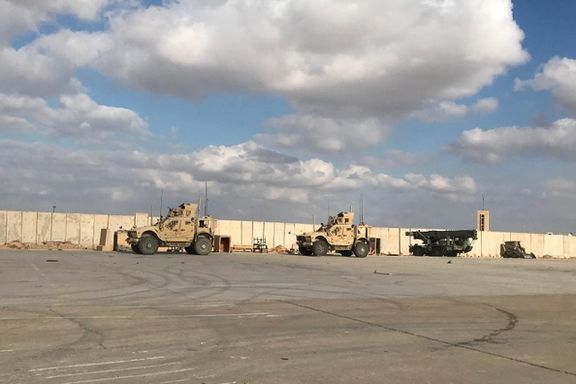
Iran-affiliated militias in Iraq have fired a large number of rockets at the Ain Al-Asad military base hosting US troops on Saturday, Iraqi media reported.

Iran-affiliated militias in Iraq have fired a large number of rockets at the Ain Al-Asad military base hosting US troops on Saturday, Iraqi media reported.
Reuters quoted a US official as saying that American personnel suffered minor injuries and a member of Iraq's security forces was seriously wounded in an attack citing initial assessments, which are subject to change. Some reports later said several Iraqi troops have been wounded.
The attack came after an Israeli air strike killed five officers of Iran’s Revolutionary Guard (IRGC) in Damascus. Among those who died when a building was targeted by precision munitions, was Hojjatollah Omidvar or Hajj Sadegh, a senior Quds Force general, and apparently a senior intelligence officer.
The official, who spoke on condition of anonymity to Reuters, said initial reports indicated that the base was hit by ballistic missiles but left open the possibility the base was hit by rockets, adding an assessment was ongoing.
Iran’s proxy forces in Iraq and Syria have launched around 140 attacks against US forces in both countries since mid-October in retaliation to US support for Israel. The Biden administration has retaliated on a few occasions, but it is not clear how it would respond to this latest attack.
Iran's Foreign Ministry spokesman Naser Kanaani condemned the airstrike in Damascus blamed on Israel saying the Islamic Republic reserves the right to respond to Israel "in an appropriate time and place."

Commanders from Iran's IRGC and Lebanon's Hezbollah are in Yemen helping to direct Houthi attacks on Red Sea shipping, regional and Iranian sources told Reuters.
Iran - which has armed, trained and funded the Houthis - stepped up its weapons supplies to the militia in the wake of the war in Gaza, which erupted after Iranian-backed Hamas attacked Israel on Oct. 7, four regional sources said.
Tehran has provided advanced drones, anti-ship cruise missiles, precision-strike ballistic missiles and medium-range missiles to the Houthis, who started targeting commercial vessels in November in solidarity with Palestinians in Gaza, the sources said.
The Houthi campaign began after Iran’s ruler Ali Khamenei in early November urged Muslims to initiate a blockade of Israel.
IRGC commanders and advisers are also providing know-how, data and intelligence support to determine which of the dozens of vessels travelling through the Red Sea each day are destined for Israel and constitute Houthi targets, all the sources said.
However, Houthis have not necessarily targeted only vessels headed for Israeli ports or linked with Israel.
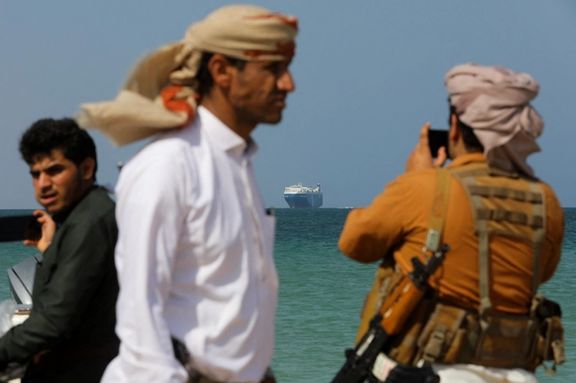
Washington said last month that Iran was deeply involved in planning operations against shipping in the Red Sea and that its intelligence was critical to enable the Houthis to target ships.
In his weekly news conferences, Iran's Foreign Ministry spokesman Nasser Kanaani has repeatedly denied Tehran is involved in the Red Sea attacks.
Houthi spokesperson Mohammed Abdulsalam denied any Iranian or Hezbollah involvement in helping to direct the Red Sea attacks when contacted by Reuters.
Houthi attacks have affected global shipping between Asia and Europe through the Bab al-Mandab strait off Yemen. That has triggered US and British air strikes on Houthi targets in the country, opening a new theater of conflict linked to the war in Gaza.
"The Revolutionary Guards have been helping the Houthis with military training (on advanced weapons)," an Iranian insider told Reuters. "A group of Houthi fighters were in Iran last month and were trained in an IRGC base in central Iran to get familiar with the new technology and the use of missiles."
The person said Iranian commanders had travelled to Yemen as well and set up a command center in the capital Sanaa for the Red Sea attacks which is being run by the senior IRGC commander responsible for Yemen.
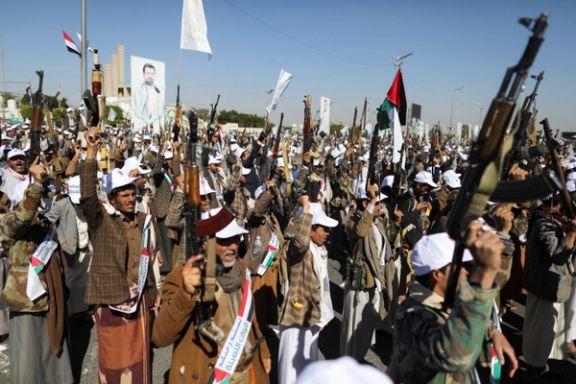
REGIONAL STRATEGY
The Red Sea attacks fit in with Iran's strategy of expanding and mobilizing its regional Shi'ite network of armed militias to project its influence and show its ability to threaten maritime security in the region and beyond, two analysts said.
They said Tehran wanted to show that the Gaza war could be too costly for the West if it drags on.
Tehran has avoided direct military involvement in the Gaza war, mainly using its proxy forces to project power.
"The Houthis are not acting independently," said Abdulaziz al-Sager, director of the Gulf Research Center think-tank, who based his conclusion on a close analysis of the capabilities of the group, which has an estimated 20,000 fighters.
"The Houthis, with their personnel, expertise and capabilities are not that advanced. Dozens of vessels cross through Bab al-Mandab daily, the Houthis don't have the means, resources, knowledge or satellite information to find the specific target and attack," he said.
White House national security spokeswoman Adrienne Watson also said last month that Iranian-provided tactical intelligence had been critical in enabling the Houthis to target ships.
According to two former Yemeni army sources, there is a clear presence of IRGC and Hezbollah members in Yemen. They are responsible for supervising military operations, training and reassembling missiles smuggled into Yemen as separate pieces, the two people said.
Abdulghani Al-Iryani, a senior researcher at the Sana'a Center for Strategic Studies, an independent think-tank, told Reuters: "It is clearly the case that the Iranians are helping identify the target and the destination. There is no local Houthi capacity to do that."
One senior regional source who follows Iran and who spoke on condition of anonymity said: "The political decision is in Tehran, the management is Hezbollah, and the location is the Houthis in Yemen."
WEAPONS AND ADVICE
Houthi spokesperson Abdulsalam said the group's aim was to target Israeli ships heading to Israel without causing any human or significant material losses. US and British strikes on Yemen would not force them to back down, he said.
"We don't deny that we have a relationship with Iran and that we have benefited from the Iranian experience in training and military manufacturing and capabilities, but the decision taken by Yemen is an independent one that has nothing to do with any other party," he said.
But a security official close to Iran said: "The Houthis have drones, missiles and everything needed for their fight against Israel, but they needed guidance and advice on shipping routes and ships, so it has been provided to them by Iran."
When asked what kind of advice Tehran offered, he said it was similar to the advisory role taken by Iran in Syria, ranging from training to overseeing operations when needed.
"A group of Iranian Guards members are in Sanaa now to help the operations," the security official said.
Washington and Persian Gulf Arab states have repeatedly accused Iran of arming, training and financing the Houthis, who follow an offshoot of Shi'ite Islam and are aligned with Tehran as part of its anti-Western, anti-Israel "Axis of Resistance" alongside Lebanon's Hezbollah and groups in Syria and Iraq.
While Iran has denied having any direct role in the Red Sea attacks, Khamenei has praised the Houthis, saying he hoped their strikes would last "until victory".
Adapted version of an exclusive Reuters report
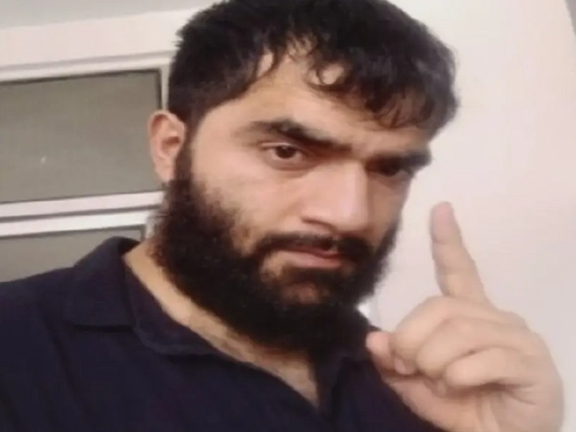
Adel Arif, who is suspected of being involved in recent twin bombings in Iran, had masterminded several attacks in Afghanistan, a former Afghan security official said.
Ahmad Zia Saraj, the last director of national security in the former Afghan government, told Afghan International that Arif was the architect of the attacks on Kabul University and Afghanistan’s presidential palace, among several others.
According to Saraj, Arif was arrested three years ago and was handed down a death penalty but was later released from prison after the Taliban took over of Afghanistan.
Due to his ties with the Taliban’s Haqqani network, Arif drove around Kabul in armored vehicles during the first eight months of Taliban’s rule, noted Saraj, further stressing that he was a close friend of Shahab al-Muhajir, the head of the Islamic State - Khorasan Province (ISIS-K), which is the militant group’s Afghanistan branch.
Saraj stated that “with Taliban entering Kabul, some 4,000 ISIS members were released from prison and dispersed across Afghan provinces and the region.”
Iran’s Intelligence Ministry announced in a statement on Friday that several ISIS-affiliated “terrorists” were arrested in connections with Karman bomb attacks on January 3.
The ministry accused Adel Arif, known as Adel Panjshiri, of having a hand in the attacks, adding that he has entered areas in western Tehran and is wanted.
On January 3, bombs targeted a memorial ceremony at the tomb of IRGC’s Qasem Soleimani, claiming the lives of nearly 100 people. The Afghanistan branch of the Islamic State group claimed responsibility. Iran launched missiles at targets in Syria earlier this week, claiming to have hit an ISIS training camp.
Soleimani, the Iranian regime’s top military and intelligence operator in the Middle East, was killed in a US drone strike in January 2020 in Iraq.

A senior IRGC officer and the governor of Iran’s East Azarbaijan province died on Saturday due to what officials said was a “respiratory and pulmonary illness.”
Zeinolabedin Khorram-Razavi, a former commander of the Revolutionary Guards, gained prominence when he and 47 others were abducted by opponents of the Syrian regime in July 2012 during the early years of the Syrian civil war. He was also known by a shorter version of his name as Abedin Khorram.
The Islamic Republic initially denied the presence of military personnel in Syria, portraying the abductees as ordinary citizens on a pilgrimage and falsely presenting them as retirees. The kidnappers, opposing President Bashar al-Assad, demanded the cessation of Iran's support for the regime and threatened to kill the hostages if their demands were not met.
Khorram-Razavi and the other captives were eventually released in January 2013, as part of an exchange for 2,130 inmates held in Syrian prisons.
Khorran-Razavi was heavily involved in suppression of the nationwide protests in November 2019, as the IRGC and its agents killed 1,500 civilians and arrested thousands.
After being appointed as the governor, he faced criticism, particularly for his handling of the protests. The Etemad Melli newspaper highlighted that his appointment aimed to exert greater control over the security situation in the region. Once President Ebrahim Raisi was elected in June 2021, he appointed many senior IRGC officers as provincial governors.
During his inauguration ceremony held in October 2021, chaos ensued when one of the participants slapped Khorram-Razavi. The incident unfolded in the presence of the Minister of Interior, adding a controversial chapter to his tenure as governor.
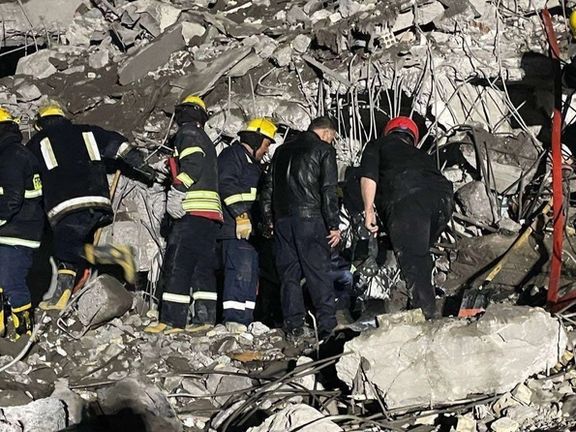
The Erbil Chamber of Commerce has urged citizens and business owners in Iraq’ Kurdistan to boycott Iranian goods in protest to the IRGC’s recent missile attack.
In a statement issued on Friday, the Chamber condemned the deadly strikes and stated that the attacks by the Islamic Republic, which have also happened in the past, violate principles of international law and human rights.
Iran has launched many attacks on the Kurdish region, claiming that it targets separatist bases, and claims the Israeli Mossad also operates in Erbil.
These actions aim to disrupt the stability and security of the Kurdistan region, the statement added. Many social media users have also called for a ban on Iranian products.
In an interview with Kurdistan 24 broadcast news station, Karwan Surchi, the spokesperson of the Erbil Chamber of Commerce and Industries, recommended that Kurdish business owners import goods from Turkey and Persian Gulf states instead of Iran.
“There is a high demand for Turkish products compared to its Iranian counterparts,” he went on to say, further stressing that “the boycotting comes in a bid to make Iran stop its aggressions.”
Kurdistan 24 reported in August that the volume of trade between Iraq’s Kurdistan region and Iran reaches $6 billion a year.
On January 15, Iran’s Revolutionary Guards unleashed a barrage of ballistic missiles in Iraq and Syria in what IRGC claimed to be retaliatory attacks against Israeli spies and ISIS.
The IRGC missiles hit a civilian house in Erbil belonging to Peshraw Dizayee, killing him and 4 members of his family. Dizayee was a business mogul and head of Falcon Investment Group. Following the raid, IRNA, the Iranian state news agency, released a report that accused Dizayee of collaborating with Israel.
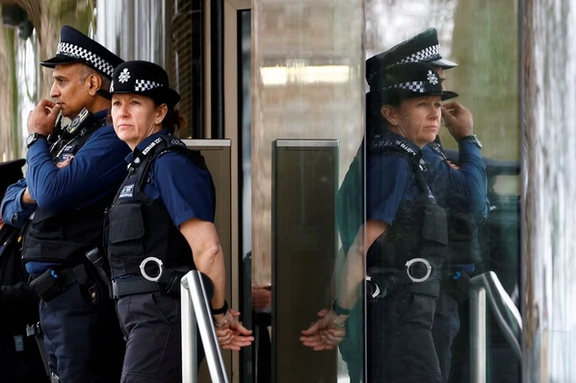
A new unit has been established in the British police to deal with threats posed by the Islamic Republic of Iran, Russia and China ahead of the UK’s general election.
Assistant Commissioner Matt Jukes, the UK’s head of counter-terrorism policing, announced on Friday that the new unit will be dedicated to specialist investigations regarding the increasing security challenges presented by the three countries.
“I don’t want to be coy. We are talking about parts of the state apparatus of Iran, China and Russia,” said Jukes, further adding that the threats of hostile states are considered to be “greater now than since the days of the Cold War.”
The new police unit will exercise the powers set forth in a national security act passed last year. The act was introduced to counter attempts made by certain foreign states to interfere with the UK’s political affairs, steal confidential trade information, and spy.
“We will be the most overt part of the UK security community stepping up its response to those hostile state actions,” Jukes stressed in reference to the new specialist investigations unit in the British police.
Though no exact date has been set for the next general election, it is expected to be held in the second half of 2024. In the upcoming election the voters will choose the members of the House of Commons, thereby determining the next government. The unprecedented volumes of online misinformation have raised concerns among the British security officials ahead of the election.
Earlier in November, Microsoft’s Threat Analysis Center (MTAC) reported that Iran, Russia and China are likely to plan to influence the upcoming elections in the United States and other countries in 2024.
“Election infrastructure, campaigns, and voters” are expected to be targeted by “authoritarian regimes,” Microsoft warned.
The report also confirmed that Iran has intensified its cyberattacks and influence operations since 2020, targeting Israel and other countries. In December 2023, Iran-linked hackers targeted a water facility in the rural area of County Mayo in Ireland, leaving the residents without water for two days. The attack was carried out by pro-Iran Cyber Av3ngers group which claimed that the facility was attacked because it used an Israeli-made piece of equipment.
Jukes also warned of the conspiracies to assassinate political dissidents on British soil, specifically referring to the 15 direct threats linked to the Islamic Republic over the past two years to target opposition figures.
Iran International, headquartered in London revealed in November 2022 that the IRGC was plotting to assassinate two Iran International television anchors in the UK amid Iranian anti-government protests. Subsequently, Iran International stopped its broadcast operations in London and temporarily moved its studios to Washington DC. In mid-2023, the network relocated to a more secure facility in London.
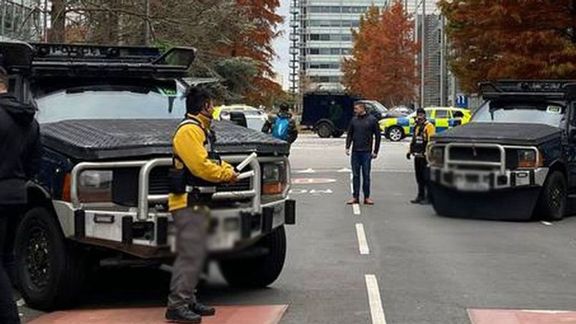
British Foreign Secretary David Cameron summoned Iran’s chargé d’affaires after assuming office and warned that Iran must be sent “an incredibly clear message that this escalation will not be tolerated.”
In February 2023, an Austrian national named Mohammad-Hussein Dovtaev was detained while filming outside the network’s premises. The Central Criminal Court of England sentenced Dovtaev to 3.5 years behind bars for attempting to collect information “likely to be useful to a person committing or preparing an act of terrorism.”
Jukes also alarmingly described the ongoing conflict between Israel and Hamas as a “radicalization moment” which can drive some people towards terrorism.
“This is not simply rhetoric. In my seat, you tend to look at dashboards of indicators ... And right now, there are needles on that dashboard that are moving in the wrong direction,” the UK’s head of counter-terrorism policing warned.
In October 2023, Ken McCallum, the Director-General of MI5, the UK’s security service, stated that amid the war between Iran-backed Hamas and Israel, the Islamic Republic may be exploring new ways to threaten the security of Britain.
“Iran has been a rising source of concern and a rising source of task for MI5 over the last 18 months or so in particular,” he then said.
The Times warned in October that Iranian agents are stirring up unrest in the UK through Gaza protests.
There is direct involvement of the Iranian regime through the physical presence of operatives at protests as well as through disinformation campaigns conducted online, the newspaper said.